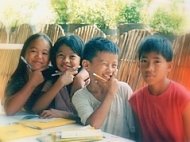Cancer Survivor

My Name is Welnar P Rivas; I was born on August 7, 1993
in
My mother sent me to school in Siaton, at
I have a problem for hearing and I can’t talk but
I go to school. I get hurt because of my situation. My aunt Jocelyn knows that there is
One Candle Schoolhouse in Tambobo. So my cousin brings my picture
and asks if for me to be a student of this school
because I want to know how to use the computer.
In One Candle Schoolhouse there is a donation to solve my problem.
I receive a hearing aid and that’s a big help for me. I learn many things like drawing, painting, and designing eggshell boxes.
I’m so happy to be a student in this school
because all the students are understand my situation.

Given such a book, Avellana then goes on to wonder how her parents would have reacted to the information that their newborn daughter would develop cancer at the age of twenty-six. She imagines they'd search for cures, become depressed at the odds given in the late 1970's, then "probably treat me like china...not allow me to have a normal childhood...(hoping) the prediction would somehow reverse itself." She even adds that they might have even "thought twice" about having their two other children.
When I first read the column, I wanted to share it with our niece whose six-week old daughter had just survived several surgeries, due to bile duct failure. Though the spectre of brain damage and a liver transplant still loom in little Tatum's future, she was home from the hospital, "eating and laughing and pooping" like a normal child. Wonderful news--but it was easy to imagine for our grandniece the author's feelings, that if her parents had known of her future cancer she, "...would have most certainly missed being a normal kid, and would have had to endure being fussed over at the slightest fall."
In the days following Welnar's death, I thought of how his mother, Rosalinda, widowed during her pregnancy, must have felt when her son was born deaf--and I realized that she had somehow found the grace to help her son "have a life...to laugh, to cry, and to exist the way (he) wanted to."
Field Trip

The student in OCHS they are all happy when teaching the disable children. I proud in the disable children because they have talent to show people.
by John Mark Dominisac
Allan Lajot writes:

It’s very hard to teach a differently-abled child but they can do what you think they can’t.
I was very pleased with their great
performances. They made me think of how different people do different work.
One Candle Schoolhouse students
making some tie-dyes.
Charlie Palallos

Normally shy, it was delightful to see her bold ascent.
Then it's Welnar's turn.
He was very
excited,
because he had been looking forward to this event all morning!
is the result of an oyster's victory
over an irritation"











No comments:
Post a Comment